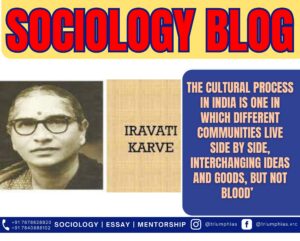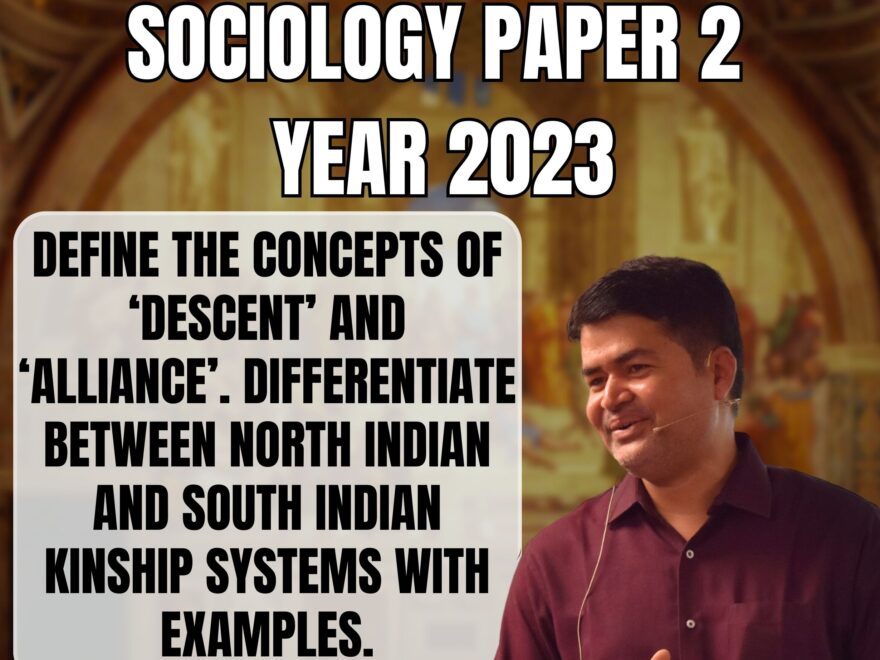Define the concepts of Descent and Alliance Differentiate between North Indian and South Indian Kinship systems with examples.
Section: A.
Sociology Paper 2023 Analysis.
Relevant for Paper 2: Unit-12 System of Kinship in India

Question 3 (b): Define the concepts of ‘Descent’ and ‘Alliance’. Differentiate between North Indian and South Indian Kinship systems with examples.
(20 Marks)
|
Introduction: Definition of Descent and Alliance Main Body: Brief Introduction of North and South Indian Kinship in Context of Irawati Karve and then Highlight Differences Conclusion: On the Lines of Intricate Diversity in Kinship in India Requires the Focus on Contextual Details. |
Introduction:
Descent group
- Descent group refers to a social group whose membership depends upon common ancestor imagined or real. It is the principle whereby a person is socially affiliated with group of his or her parents, grandparents and so on. The individual can simultaneously belong to multiple descent groups, those of two parents, four grandparents and eight great grandparents and so on.
- The practical importance of descent comes from its use as a means for one person to assert rights, duties, privileges, or status in relation to another person, who may be related to the first either because one is ancestor to the other or because the two acknowledge a common ancestor. Descent has special influence when rights to succession, inheritance, or residence follow kinship lines.
Alliance
- In kinship Alliance is generally defined in terms of marital alliances. Where kinship results as a consequence of marriage.
- According to Mandelbaum – ‘Marriage is much more than a sexual union in India as a marriage mobilizes the family’s social resources and through marriage, members renew kin ties or establish new bonds of kinship. It is socially acknowledged and approved.
Main body:
North Indian kinship and South Indian kinship
- Iravati Karve had explained the ideal type of kinship cultural system for which she divided India in different linguistic zones.
- According to Irawati Karve, kinship groups in India have a common language, culture, social practices etc. and there is variation in Kin’s culture in different regions of India.
Difference between North and South Indian kinship systems
- In a southern family, there is no clear-cut distinction between the family of birth, that is, family of orientation and family of marriage, that is, family of procreation as found in the northern family. In the north, no member from Ego’s family of orientation can also become a member of his family of marriage; but this is possible in the south.
- In the north, an Ego (person under reference/study) has some kin who are his blood relatives only and others who are his affinal. In the south blood relatives are affinal kin at the same time.
- In the south, organization of kin is arranged according to age categories in the two groups, that is, older than Ego (tam-mun) and younger than Ego (tam-pin) (tam is ‘self’, mun is ‘before’ and pin is ‘after’).
- In the south, kinship organization is dependent on the chronological age differences while in the north, it is dependent on the principle of generational divisions.
- One of the fundamental distinctions between the two systems lies in their descent patterns. North Indian kinship is predominantly patrilineal, meaning descent is traced through the male line. In contrast, South Indian kinship is often matrilineal, where descent is traced through the female line. However, it’s important to note that these patterns are not absolute, and variations exist within both regions.
- No special norms of behaviour are evolved for married girls in the south whereas in the north, many restrictions are imposed on them.
- Marriage does not symbolize woman’s separation from her father’s house in the south but in the north, a woman becomes a casual visitor to her parent’s family
- The dichotomy of status and sentiments expressed in such northern terms like kanya (unmarried girl), bahu (married girl), pihar (mother’s house) and sasural (husband’s house) are absent in south.
- In the north, marriage is to widen the kinship group while in the south it is to strengthen already existing bonds.
- In South Indian Kinship the taboos prescribed for marriage are that man cannot marry his younger sister’s daughter, a widow cannot marry her husband’s elder or younger brother, that is, levitate is a taboo; a man cannot marry his mother’s sister’s daughter. However levitate is not taboo in north India. In the north marriage is dependent on the chronological age differences rather than the principle of generational divisions.
Conclusion:
It is essential to acknowledge that India’s vast diversity results in a rich tapestry of kinship practices, making generalizations challenging. Understanding kinship systems in India requires sensitivity to local customs, historical contexts, and the complex interplay of cultural factors.
Related Blogs…
 |
 |

To master these intricacies and fare well in the Sociology Optional Syllabus, aspiring sociologists might benefit from guidance by the Best Sociology Optional Teacher and participation in the Best Sociology Optional Coaching. These avenues provide comprehensive assistance, ensuring a solid understanding of sociology’s diverse methodologies and techniques.
META TAGS:
Iron Law of Oligarchy, Robert Michels, Vilfredo Pareto, Lions and Foxes theory, power dynamics, organizational oligarchy, elite circulation, political sociology, leadership styles, organizational control, sociological theories, political maneuvering, elite differentiation, power concentration, societal stability, political leadership, strategic political leadership, Sociology Question Paper, Sociology Question Paper 2023, Sociology Question Paper CYQ, Sociology Question Paper UPSC, What, according to Robert Michels, is the iron law of oligarchy? Do lions and foxes in Vilfredo Pareto’s theory, essentially differ from each other? Substantiate.
Why Vikash Ranjan’s Classes for Sociology?
Proper guidance and assistance are required to learn the skill of interlinking current happenings with the conventional topics. VIKASH RANJAN SIR at TRIUMPH IAS guides students according to the Recent Trends of UPSC, making him the Best Sociology Teacher for Sociology Optional UPSC.
At Triumph IAS, the Best Sociology Optional Coaching platform, we not only provide the best study material and applied classes for Sociology for IAS but also conduct regular assignments and class tests to assess candidates’ writing skills and understanding of the subject.
Choose The Best Sociology Optional Teacher for IAS Preparation?
At the beginning of the journey for Civil Services Examination preparation, many students face a pivotal decision – selecting their optional subject. Questions such as “which optional subject is the best?” and “which optional subject is the most scoring?” frequently come to mind. Choosing the right optional subject, like choosing the best sociology optional teacher, is a subjective yet vital step that requires a thoughtful decision based on facts. A misstep in this crucial decision can indeed prove disastrous.
Ever since the exam pattern was revamped in 2013, the UPSC has eliminated the need for a second optional subject. Now, candidates have to choose only one optional subject for the UPSC Mains, which has two papers of 250 marks each. One of the compelling choices for many has been the sociology optional. However, it’s strongly advised to decide on your optional subject for mains well ahead of time to get sufficient time to complete the syllabus. After all, most students score similarly in General Studies Papers; it’s the score in the optional subject & essay that contributes significantly to the final selection.
“A sound strategy does not rely solely on the popular
Opinion of toppers or famous YouTubers cum teachers.”
It requires understanding one’s ability, interest, and the relevance of the subject, not just for the exam but also for life in general. Hence, when selecting the best sociology teacher, one must consider the usefulness of sociology optional coaching in General Studies, Essay, and Personality Test.
The choice of the optional subject should be based on objective criteria, such as the nature, scope, and size of the syllabus, uniformity and stability in the question pattern, relevance of the syllabic content in daily life in society, and the availability of study material and guidance. For example, choosing the best sociology optional coaching can ensure access to top-quality study materials and experienced teachers. Always remember, the approach of the UPSC optional subject differs from your academic studies of subjects. Therefore, before settling for sociology optional, you need to analyze the syllabus, previous years’ pattern, subject requirements (be it ideal, visionary, numerical, conceptual theoretical), and your comfort level with the subject.
This decision marks a critical point in your UPSC – CSE journey, potentially determining your success in a career in IAS/Civil Services. Therefore, it’s crucial to choose wisely, whether it’s the optional subject or the best sociology optional teacher. Always base your decision on accurate facts, and never let your emotional biases guide your choices. After all, the search for the best sociology optional coaching is about finding the perfect fit for your unique academic needs and aspirations.
Follow us :



Find More Blogs…
| Compare and contrast Karl Marx’s and Max weber’s | Karl Marx- Historical Materialism |
| Position of Women In the Modern Indian Society | Sociology: Social system and pattern variables |




One comment